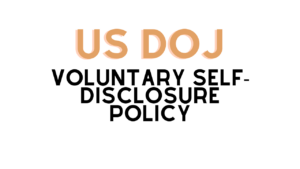Carrots and Sticks: DOJ’s Push to Incentivize Voluntary Disclosure of Corporate Misconduct (Part II of II)

DOJ has been on a public relations campaign to push a simple message for corporations: if companies learn of misconduct, companies should disclose such misconduct to earn valuable benefits. The quintessential question remains — should companies disclose misconduct to the Department of Justice or should the company remediate the misconduct and maintain its silence?
DOJ’s campaign is intended to push companies to reconsider this balance by offering new and significant benefits from self-disclosure and cooperation. At the same time, DOJ is articulating a new, refocused vision of its white collar enforcement program — pointing to the twin goals of promoting good corporate citizenship. To this end, Deputy Attorney General Monaco, in her recent March 7, 2024 speech, highlighted the twin goals of “holding individuals accountable for corporate misconduct” and “imposing stiffer penalties on corporate recidivists.”
DOJ employs a “mix of carrots and sticks” to incentivize companies to build stronger compliance programs that proactively mitigate risks and disclose misconduct to DOJ when appropriate.

DAG Monaco underscored the fact that a corporate resolution “will always be more favorable with voluntary self-disclosure.” She specifically cited recent pilot programs in the Southern District of New York and the Northern District of California that extend voluntary self-disclosure benefits to individuals who report new information to DOJ and agree to cooperate against other culpable individuals.
As another significant incentive, DAG Monaco cited DOJ’s recently-adopted Mergers & Acquisitions Safe Harbor Policy, announced in October 2023, which is intended to incentivize companies to report misconduct discovered within six months of acquiring a company. Companies that take advantage of such a safe harbor will earn a presumption declination.

In addition to the significant benefits from voluntary self-disclosure and the M&A Safe Harbor, DOJ has offered companies benefits from its Compensation Incentives and Clawbacks Pilot Program, which offers companies a dollar-for-dollar reduction in monetary penalties. To this end, DAG Monaco cited the importance of punishing individual wrongdoers to prevent them from earning bonuses directly the ressult of illegal conduct.
DAG Monaco pointed to DOJ’s aggressive prosecution of corporate recidivists to underscore the “stick” against corporate misconduct. In addition, DAG Monaco noted that DOJ employed novel penalties against companies that failed to invest in compliance after prior enforcement actions.
As examples of this approach, DAG Monaco stated that DOJ insisted that Ericsson, the telecommunications company, enter a guilty plea to FCPA violations after it breached a 2019 deferred prosecution agreement. In addition, DAG Monaco noted that DOJ required Teva to divest itself of a product line for its participation in a price-fixing conspiracy that occurred after Teva’s 2016 deferred prosecution agreement for FCPA violations.
DAG Monaco emphasized that DOJ’s goal is to motivate companies to step up and report misconduct to the government. In doing so, companies have to recognize the significant benefits resulting from being the “first-in-the-door” to report misconduct.

Corporate calculations of benefits and costs will undergo significant re-evaluation given DOJ’s plan to implement a whistleblower reward program. By inducing individuals to report misconduct through financial rewards, DOJ is creating a significant risk for companies that decide to investigate misconduct, remediate misconduct and decide NOT to voluntarily disclose the misconduct to the government. In this situation, companies may face a significant risk that an individual could be the “first-in-the-door” and report company misconduct. Instead, companies may now face a race to DOJ to beat an individual whistleblower seeking a financial reward from DOJ under the new compensation program.















